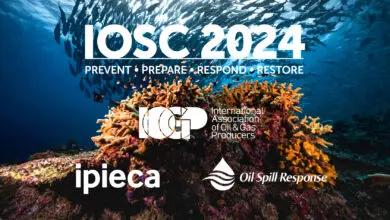
Energy at a crossroads: which way next?
Speech by Fuzzy Bitar, IOGP chair and SVP HSE & carbon, bp at IOGP's AGM 2022
Hello and welcome to the IOGP’s Annual General Meeting.
It’s great to have you join us – some in person, some online but all very, very welcome.
A big thank you to Iman and the team at IOGP for getting 2022 off to a solid start, even amid some very challenging conditions.
After a certain amount of time in this industry, you get a certain understanding for how the energy system works.
It’s not like you can predict what will happen – but you get some of the basics.
You figure out what kind of energy is needed and where.
Who supplies it and how.
What it takes to produce and get it where it needs to be.
These trends evolved over many decades. And while there have been upsets and shocks along the way – you could, at least, argue that those currents led us to where we are today at least fairly predictably.
It’s almost like we’ve been following a path – and while we may not have known exactly where it’s heading, at least the terrain has felt familiar. And maybe we’ve had some kind of map to guide us.
Until now.
Russia’s brutal invasion of Ukraine is first and foremost a human tragedy.
My heart goes out to the millions of people who have been affected and had their lives destroyed.
But, of course, the ramifications stretch much wider.
There are clear political and economic consequences.
And the energy sector – the industry that many of us know so well – has been turned on its head. Perhaps permanently.
I mean, for most of the recent past, the energy market has been finely balanced between supply and demand – very finely balanced.
There are not swathes of excess supply that can be swiftly redirected if there’s a sudden change in energy flows.
So it doesn’t take much to upset that balance.
Just look at where Europe is today – oil and gas make up more than half of Europe’s energy supply. Russia accounts for a quarter of Europe’s gas, or more. And Europe has accounted for around half of Russia’s oil exports.
So the invasion of Ukraine – doesn’t so much upset the cart – it demolishes it.
Because Russia’s role in a globalised world has changed overnight.
Political relations, trading patterns, established business activity … it’s all being rewritten.
And energy security has shot up the priority list – at least in the minds of Western governments.
Energy that has for decades been seen as a given – is now not seen as certain.
As restrictions on those supplies bite – whether through formal sanctions or less-formal self-sanctioning, those patterns will be impacted.
We don’t yet know how much – but the established norms as we have known them are, at the very least, open to question – and potentially, being re-engineered.
This begs many questions over different timeframes… there are the immediate and medium-term ones:
How will Europe meet its energy needs? Where will those supplies come from?
What will happen to Russian supplies?
How will energy investment patterns change?
How many new oil and gas projects will we see opening up as governments chase alternative ways to meet their energy needs?
And at the same time, how will investment in renewables shift?
Very real questions. That need answering.
But I would argue there is a bigger, longer-term – and even more serious question that we have to address.
One that if we’re not careful, we could lose sight of amid the current political chaos.
And that’s about what all this upheaval means for the energy transition.
I have heard several convincing – but polar opposite explanations – for how this could play out.
It’s like this path we’ve been following has forked – with two new paths stretching out in different directions.
Down one path, there are those who suggest fears over near-term supply issues could pull the world back – closer to the comfort of tried and tested hydrocarbons as economic and affordability concerns mount.
Down the other, there are those suggesting this crisis heralds the end of fossil fuels – forcing heel-dragging governments to pivot faster to lower carbon – and avoid being overly dependent on oil and gas imports.
Optimists and pessimists. You can decide which.
So my question today is which path will our industry take?
Well, I’m a fairly well-organised guy. I like to do my research. Why don’t we take a short stroll down both and see how they look.
Let’s try the first path. The one that looks more familiar.
Where we can recognise the terrain and are pretty confident of the route.
That’s the one where we justify more investment into our traditional oil and gas businesses. Focus on supply. On Security.
Sure. It would solve the short- and medium-term problems over where we’ll get energy from. But it’s also a route that, over time, could see the energy transition stall.
Where the world loses sight of its goal of getting to net zero. And where – I would argue – we would arrive at with even greater problems.
So let’s go back to that fork in the road and try the other path.
One where we deal with the problems of today but we don’t lose sight of where we’re heading.
The destination society has set – with net zero in our sights.
If we go that way… yes, we shore up the supply of hydrocarbons – we bolster energy security – we invest in the hydrocarbons the world needs.
We do what’s needed now.
But we do so cleverly.
And we think not just of the energy that society is demanding today but also the lower carbon energy that is increasingly being called for today and tomorrow.
And this is where oil and gas companies – IOGP members – have a special role to play.
As we find our way down this path, I would argue that we shouldn’t just see today’s supply disruptions to justify further spending – and ramping up production – certainly not without regard for the global need to decarbonise.
I just can’t see that ending well – either for our industry or for the societies we serve.
Yes, we need to invest in production. But we do so cautiously. Carefully. And we focus on value over volume.
For every barrel we produce, we do everything we can to mitigate emissions – clamping down on methane, reducing flaring, and investing in all the technologies that allow hydrocarbons to play a role in a world that’s charting its path towards net zero.
And despite speaking to an audience of oil and gas producers – I believe we have to increase our investment in renewables.
I might even go one step further – and, I’ll be honest, I was unsure whether I should go this far. But I think it’s necessary.
I would argue that we need to rethink our approach to exploration and production of new projects.
That we should strive to create a new normal – where increasingly we only explore and produce new oil & gas where we’ve assessed every opportunity to attach an integrated carbon solution to it – whether that’s hydrogen, CCS or some other meaningful option. That will mean considering carbon as part of the investment decision.
That might be a tall order – and I appreciate it’s not fully within our control. It would require support from governments and partners. Projects would still need to make commercial sense. But let’s be clear – it might mean not developing projects we have done in the past.
I say this because I believe it is key to our industry playing a welcome role in the energy system of tomorrow. We can only be welcome if we’re giving society what it wants and needs. I believe this is what it needs – and increasingly, it’s also what societies around the world are calling for.
So two paths. Two options. But I would argue, one fairly obvious choice.
But here’s the thing… I set this out as the first path dealing with the energy security and the second dealing with the energy transition.
But actually, the second path deals with energy security too.
Because if we do oil and gas right – and at the same time, lower emissions and help diversify the energy system – then we help ween countries off hydrocarbon supplies… making them less beholden to other states. And in turn boosting energy security.
That presents a fairly convincing case, I think.
Of course, we’re not the only ones who have a role to play here. We don’t operate in a vacuum.
Consumers of all kinds need to think hard about the energy they’re using.
Governments need to implement incentives.
And everyone needs to improve energy efficiency.
As always we should be working with everyone we can to find the solutions society needs.
And if everyone pulls together, if we all play our part – including oil and gas producers. Then I believe we can find the right path.
One that keeps energy flowing today and helps society transition tomorrow.
But for that to happen, we need those urging us to choose a different road to come together.
Energy has always been a great unifier – regardless of where people live or what their governments do, there is always a need for energy.
That is still true today. And so energy’s role as a unifier should continue. But perhaps the way it brings us together will change. And I hope our common goal of bolstering energy security, while making the energy transition work for the societies we serve – will help guide us all as we embark on this new chapter.
Let’s use the crisis in Ukraine as a catalyst not to divide us but to bring us together.
Thank you.



